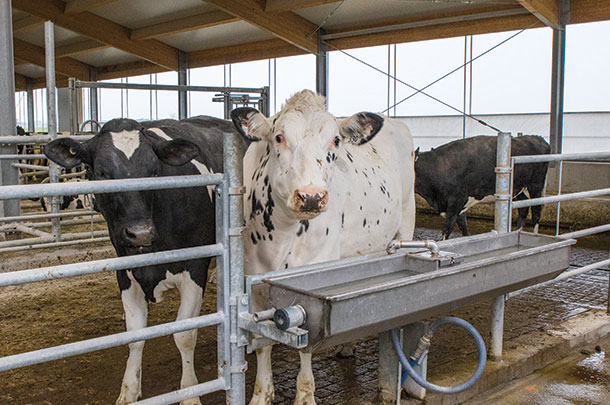Low-quality water means less feed and water consumed. Cleaning and testing your water are essential.
Cleaning
Blue-green algae (cyanobacteria) can easily build up in waterers and release toxins that cattle can ingest. In order to keep this to a minimum, clean your waterers frequently.
- Empty water from trough.
- Scrub with stiff-bristled brush and detergent.
- Rinse with water.
- To prevent further growth, add diluted, unscented chlorine bleach or copper sulfate crystals.
Disinfection dilution rates
(Note: Rates vary based on the product you use, consult your veterinarian.)
- Bleach: Add 2-3 ounces of bleach per 150 gallons of water (conduct as often as every week).
- Copper sulfate crystals: Dilute 1.5 teaspoons into 4.5 ounces of warm water first, then add to 1,000 gallons of water (or equivalent dose to 1 part per million) every four to five weeks.
- Chlorine dioxide: Follow label instructions to dilute.
Ideally, let the bleach or copper sit one hour before allowing livestock to drink.

Adding bleach, copper sulfate, chlorine dioxide or other products to dirty waterers is very ineffective. You first need to clean away organic debris and any buildup of materials.
Testing
Now that you have made sure the way the water is getting to the animals is clean, ensure the water itself is of high quality. Regular annual testing of your water is recommended.
How to sample: Use clean containers and collect 1-pint samples at random intervals. Pour all samples into a 1-gallon container, and mix to take your final sample. Follow specific lab guidelines.
Water tests will show levels of the following present in the water:
- pH
- Total dissolved solids
- Nitrates
- Sulfates
- Additional factors
Any of these factors can cause livestock health issues. In order to find a solution to your water problem, work with your veterinarian to come up with a solution. These solutions may not be quick and easy fixes, but they are well worth the healthy and productive cattle you will get in return. ![]()
PHOTO 1: Water is the most important nutrient we can give our cattle, yet it is often overlooked.
PHOTO 2: These solutions may not be quick and easy fixes, but they are well worth the healthy and productive cattle you will get in return. Photos by Mike Dixon.

-
Angela Garavet
- Professional Services Veterinarian
- Animart
- Email Angela Garavet






